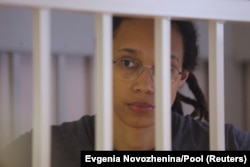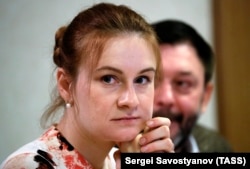On August 4, a Russian court sentenced U.S. basketball star Brittney Griner to nine years in a Russian penal colony on drug-smuggling charges.
Griner had been arrested in February at a Moscow airport with hashish oil cartridges in her luggage. Her lawyers have appealed the sentence, and talks are under way to free Griner and other U.S. citizens jailed in Russia via a prisoner swap.
On August 17, Russia’s ambassador to the United States, Anatoly Antonov, turned his attention to Russian citizens who have been held in U.S. prisons when asked about prisoner swaps with the United States.
They include Konstantin Yaroshenko, serving 20 years in a U.S. prison on drug smuggling charges. In April, the U.S. exchanged Yaroshenko for former U.S. Marine Trevor Reed, serving nine years for allegedly assaulting Russian police.
Calling for Griner’s release, Reed described his detention as nightmarish and Russia’s legal system as “medieval.”
For his part, Antonov argued that Russian citizens are unfairly being hunted by the United States, with some suffering "hardships" tantamount to torture:
“Just remember Maria Butina, our parliament MP! She was unfairly held in prison for over 18 months, abused, harassed, and tortured. When it comes to putting Russians under psychological pressure, no holds are barred. No effort is spared to get a confession out of them. Failing to achieve that, they are threatened with long prison terms.”
But that characterization is false, and there is no equivalence with Griner's case. Moreover, Butina at first denied being tortured in U.S. detention, only reversing herself after being released and deported.
Butina was a Russian agent. In December 2018, she pleaded guilty to conspiracy and acting under the direction of the Russian government. A U.S. federal court sentenced her to 18 months in prison in April 2019. Butina was released in October 2019 and sent back to Russia after serving 15 months.
Media portrayals of Butina as a “spy” have skewed perceptions of the charges against her. Prosecutors said Butina ”was not a spy” or intelligence officer “in the traditional sense of trying to gain access to classified information to send back to her home country.”
Rather, she was tried under under "18 U.S. Code Section 951 - Agents of foreign governments," a law that has been described as “espionage lite.” It targets "espionage-like or clandestine behavior or an otherwise provable connection to an intelligence service, or information gathering or procurement-type activity on behalf of a foreign government."
Butina had worked to cultivate ties with U.S. political groups and individuals — primarily conservatives and the National Rifle Association (NRA) — on behalf of Alexander Torshin, the deputy governor of Russia’s Central Bank and a Russian senator whom Spanish investigators have linked to Russian mafia activity.
The U.S. Treasury Department sanctioned Torshin in April 2018, identifying him as a Russian government official “who benefit[s] from the Putin regime and play[s] a key role in advancing Russia’s malign activities.”
Torshin and Butina worked to establish ties between the NRA and a Russian version of that organization which Butina set up in 2011 called “Right to Bear Arms.”
Prosecutors alleged that connection was used to help establish a “back channel” that “could be used by the Russian Federation to penetrate the U.S. national decision-making apparatus to advance the agenda of the Russian Federation.”
Butina was in contact with individuals believed to be “Russian intelligence operatives,” prosecutors claimed in a court document:
“The FBI has acquired email and other electronic evidence documenting Butina’s work on behalf of Russia, including taskings, reporting, and attempts to be ‘incognito.’ The evidence establishes that Butina’s purpose for coming to the United States was to work on behalf of the Russian Federation. Further, numerous witnesses will testify about the influence activities described in the complaint.”
The affidavit supporting the charges against Butina lists more than 30 instances in which Butina received direction or took action in the influence operation.
Although Russian President Vladimir denied knowing Butina (some evidence suggests otherwise), and she was not prominent in Russia, upon returning home, Butina was given a job at Russian state-broadcaster RT. There, she defended the jailing of Russian opposition activists.
She published a book about her own experiences in prison, and has used her position to advocate for Russian prisoners abroad. She also appeared unwilling to address allegations of grave abuses in Russian prisons, including torture and rape.
In April 2021, Butina conducted an “ambush interview” with jailed Russian opposition activist Alexey Navlany, who was on hunger strike after being denied medical care. In that hostile interview, Butina denied Navalny’s ailments, and said his prison conditions were better than what one would find in a regional hotel.
Russia’s security services have been linked to Navalny’s August 2020 poisoning with a military-grade nerve agent on a flight from Tomsk to Moscow. After receiving medical care abroad, Navalny was immediately arrested upon returning to Russia.
Butina then ran as a member of United Russia, Putin’s ruling party, for a seat in the State Duma (the lower house of Russia’s parliament) representing the Kirov region. After she failed to secure the seat, the Kirov governor vacated his Duma seat so she could have it.
Butina was put on the Duma’s Foreign Affairs Committee, further raising her profile.
Back in June 2014, Butina called for Russian troops to be openly deployed to eastern Ukraine (despite Russian denials, Russian troops had been clandestinely deployed there prior to the February 2022 invasion.)
The U.S. Treasury sanctioned her for being one of the “key enablers” of Russia’s full-scale invasion of Ukraine in February.
To be sure, Butina’s allegations that she was tortured in prison do deserve consideration.
Polygraph.info previously found no evidence that Butina faced prison conditions that deviated from U.S. criminal justice system norms. Although some say extended time in solitary constitutes psychological torture, there is no evidence Butina faced physical torture or abuse. In April 2019, Butina said she did not consider her treatment in prison to be torture.
"There was no torture, but I really was held in isolation for a long time,” Russian news agency TASS quoted Butina as telling journalists in a telephone interview on April 30, 2019.
“The first 35 days in a Washington prison, then (after a two-month break) 35 days in isolation in the Alexandria jail, then 38 more days. For 22 hours, I was locked alone in my cell. For two hours at night, from 1 a.m. to 3 a.m., I was given time for a shower, to use my phone – absolutely anything."
Russian state broadcaster Rossiya-1 described Butina as having “no complaints at the moment” in its report based on that telephone interview.
Butina said her life in U.S. custody was characterized by “work, gymnastics and books.” She said she had access to Russian literature in the prison library, and devoted her time in prison to her personal development.
However, upon returning to Russia, Butina told Russian state-media that her experience in prison was torture, citing her time in solitary confinement.
A U.N. human rights expert has said prolonged solitary confinement of more than 15 consecutive days is a form of torture, and criticized the United States for excessive use of the practice. Some studies support the conclusion that solitary confinement causes lasting harm.
Last week, a Russian Foreign Ministry spokesman told Reuters that Russia and the United States were engaged in “quiet diplomacy” that could see Griner released in a prisoner swap.
Sources told Reuters the United States had offered to hand over Russian arms trafficker Viktor Bout in exchange for Griner and Paul Whelan, a former U.S. Marine accused of spying and sentenced to 16 years in prison in June 2020.










